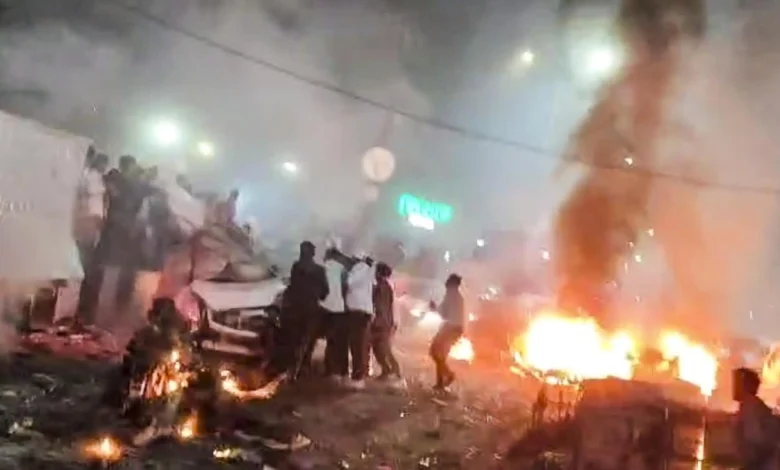If Monday evening’s blast near the Red Fort — a place that symbolises the nation’s sovereignty — is any measure, we are again reminded that terror is no distant abstraction but an immediate, painful fact. In moments like these, the nation looks not for slogans but for clarity, for leadership that acts with both muscle and moral authority. Instead, what we see all too often from the Opposition and their apologists is a reflexive rush to politicise, obfuscate and diffuse blame — behaviour that is irresponsible at best and dangerous at worst.
Let there be no ambiguity: the foremost duty of any government is to protect its citizens. Intelligence inputs must be acted upon promptly; chains of command must function decisively; and investigations must be rigorous, transparent, and swift.
Ironically, a YouTuber had cautioned about Pakistan-based Hamas elements allegedly planning to “take control of Indian skies” and create mayhem during the second phase of the Bihar polls. If such alerts were available in the public domain, our intelligence services should have taken note — and not dismissed them lightly. (See the video.)
Based on initial reports, the police now suspect the massive explosion — which claimed nine lives and injured more than twenty — to be the handiwork of Pakistan-based Jaish-e-Mohammed operatives. If this is confirmed, India must walk the talk.
It must also be said, without hesitation, that cracks in the security apparatus are becoming evident. When law enforcement turns slow, indifferent, or politicised, it is the ordinary citizen who pays — in blood and in fear. The nation has no patience left for theatrics, nor for politicians who trade national security for petty political gain.
The Congress and its allies bear a special responsibility. When national crises arrive, opposition parties should test the government robustly — not traffic in conjecture or lend moral cover to forces that benefit from chaos. Yet there is an all-too-familiar pattern: in the aftermath of a scare, instead of constructive scrutiny, we get point-scoring, blame-laying and the acceleration of dangerous narratives that pit citizens against one another. That is not opposition; it is abdication of duty. The country’s military leadership has not minced words.
Chief of Army Staff General Upendra Dwivedi publicly warned Pakistan that continued state-sponsored terrorism will be met with a far more decisive response than in the past — a blunt message that placed the onus squarely on Islamabad to choose between stopping terror or facing ruinous consequences.
Such warnings are not sabre-rattling; they are the language of deterrence — a clear signal that India’s patience has limits and that the armed forces have been primed to act with calibrated force to destroy terror infrastructure, not to indulge in headline-grabbing fantasies of annihilation. After all, Pakistan has for decades sworn to “bleed India with a thousand cuts” — a cynical doctrine of proxy war and terror sponsorship even as its own economy collapses under debt, political anarchy, and international isolation. That a failed state continues to export violence while begging for bailouts should outrage every Indian.
Adding insult to injury, former U.S. President Donald Trump has again chosen to make reckless and false claims — declaring India a “dead economy” and alleging the loss of fighter jets in the recent four-day conflict, a statement that is not only inaccurate but offensive. Such misinformation, designed for domestic applause, only emboldens India’s enemies and disrespects the professionalism of our armed forces.
The world must know: India’s economy remains resilient, and its military has neither the weakness nor the confusion its detractors imagine. To the Modi government: rhetoric alone will not do. Threats — however rhetorically satisfying — cannot substitute for carefully calibrated strategy. If this country is to be safer, the Union must tighten intelligence sharing with states, harden critical infrastructure, re-evaluate vulnerabilities in urban public spaces, and ensure that counter-terror operations respect both law and rights.

If arrests and seizures are made, their prosecution must be swift, transparent, and public to preserve confidence in the system. Equally, the government must resist the temptation to weaponise security for electoral gain. Democracies become brittle when every major security incident is treated as a political cudgel rather than a national emergency. There must be a firm firewall between genuine national security responses and partisan advantage. Ministers and officials should brief the public soberly, and the Opposition should hold them accountable without carelessly inflaming public sentiment.
Meanwhile, the Home and Defence Ministries must avoid complacency. If required, they should advise state governments to divert or even suspend civilian traffic through cantonment areas where our armed forces reside. We can never rule out the possibility of rogue elements attempting acts of sabotage in such zones — a move that would not only endanger lives but also send deeply damaging signals.
And to the public — do not let fear be your tutor. Panic and rumours are the enemy’s best ally. Exercise civic restraint. Demand evidence, not assertions. Protest where redress is owed, but do so within the law — and with the awareness that reckless street agitation in the name of “anger” only aids those who seek to destabilise us. The bottom line is simple: the nation needs competence, not conspiracy.
It needs accountability, not chest-thumping. It needs politics that rise to the demands of security rather than sinking into opportunism. If our leaders and opposition parties cannot meet this basic standard of seriousness, then the real enemy has already won — by turning the public square into a theatre of fear rather than a forum of democratic resolve. Hence, India must answer terror with resolve, not rhetoric — and hold its politicians to the same standard.





